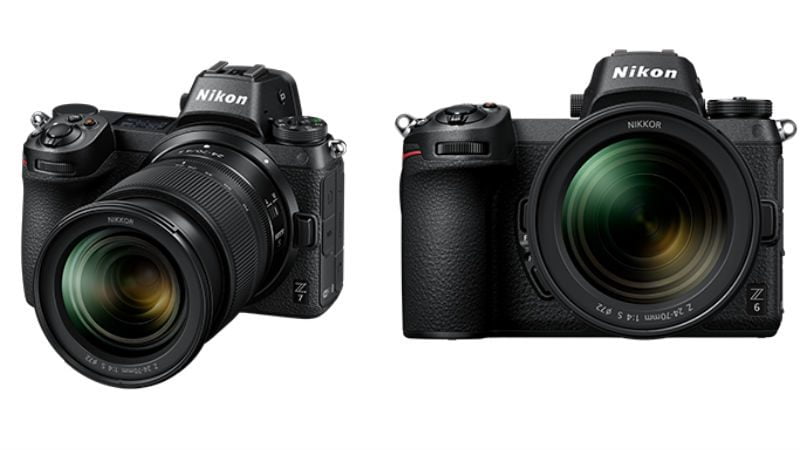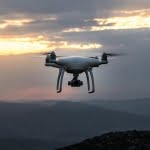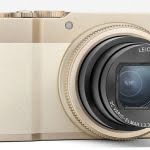
Nikon Z7 (Left) and Nikon Z6 (Right) kick off a new full-frame mirrorless segment
Nikon, after teasing their arrival last month, has launched its first full-frame mirrorless cameras to take on Sony. The company has unveiled the Nikon Z7 and Nikon Z6 in the photography market. The two cameras, one high-end and one mid-range, offer a similar design but differ in terms of megapixels, focus points, and ISO range. The company has also unveiled the new Nikkor Z lenses, feature a new larger diameter mount. Nikon notes that the letter ‘Z’ in the new lineup represents the “culmination of Nikon’s relentless pursuit of ultimate optical performance, and a bridge to a new chapter.”
In terms of specifications, both the Nikon Z7 and Nikon Z6 come with a backside illuminated CMOS sensor, with focal-plane phase-detection AF pixels. The Z 7 features a 45.7-megapixel sensor and supports the ISO 64-25600 range of standard sensitivities. However, reduction to the equivalent of ISO 32 and expansion to the equivalent of ISO 102400 is also possible. Meanwhile, the Nikon Z6 has a 24.5-megapixel sensor, and supports an ISO range of 100-51200, including an additional reduction to the equivalent of ISO 50 and expansion to the equivalent of ISO 204800.
Notably, the Nikon Z7 has 493 focus points and the Nikon Z6 has 273 focus points, covering 90 percent of the imaging area both horizontally and vertically. The company says that the hybrid autofocus system uses an algorithm optimised for the FX-format sensor, and automatically switches between focal-plane phase-detection AF and contrast-detect AF to achieve focus.
The Nikon Z7 and Z6 come with a new Expeed 6 image-processing engine. The mid-range sharpening option has been added to Picture Control sharpness parameters. Also, the cameras offer 20 options of Creative Picture Control, supporting creative imaging expression. The effect level is adjustable from 0 to 100.
Both the Nikon Z7 and Z6 come with an electronic viewfinder for which a roughly 3690k-dot OLED panel has been adopted. Nikon says that the electronic viewfinder has frame coverage and magnification of approximately 100 percent and 0.8 times, and approximately 37.0-degree diagonal viewing angle.
Meanwhile, a fluorine coating that effectively repels dirt has been applied to the eyepiece protection window. Addition, the menu can be displayed in the electronic viewfinder, allowing users to quickly view and adjust a variety of shooting settings, including ISO sensitivity, AF-area mode, and Picture Control, all while looking through the viewfinder, the company said.
The Nikon Z7 and Z6 provide in-body image stabilization or vibration reduction that claims up to 5 stops efficiency with native Nikon Z lenses and 3 stops with adapted Nikon F lenses. Both the Nikon Z7 and Z6 can capture 10-bit 4:2:2 3840×2160 pixels 4K video at 24, 25, and 30 fps.
Apart from the cameras, Nikon has also launched the first three lenses for the Z mount in conjunction with a new ‘S-Line’ moniker for its premium lens models. The three new lenses are the standard zoom Nikkor Z 24-70mm f/4 S, the wide-angle prime Nikkor Z 35mm f/1.8 S, and the standard prime Nikkor Z 50mm f/1.8 S. They are equipped with functions that include: compensation for focus breathing (the shifting of the angle of view when the focus is adjusted), quiet operation, smooth exposure control, a control ring, and performance that are all well suited to movie recording.
Additionally, Nikon will add six more Z-mount models in 2019, including 85mm, 20mm, 14-30mm, a faster 24-70mm and 70-200mm lenses. Finally, a 50mm f/1.2, 24mm f/1.8, 14-24mm f/2.8 and three unnamed models will then arrive in 2020, and more beyond that. Nikon has also developed the FTZ adapter, which adapts existing Nikon F AF-S DSLR lenses to the new mirrorless mount.
In terms of pricing and availability, the Nikon Z7 will ship by the end of September. It’s body will be available for $3,400 (roughly Rs. 2,38,000) and it will cost $4,000 (roughly Rs. 2,80,000) with the 24-70mm f4 lens. The Z6 will be available in late November. Its body is priced at $2,000 (roughly Rs. 1,40,000) and $2,600 (roughly Rs. 1,82,000) for a kit with the same lens.
Meanwhile, the 35mm lens is priced at $850 (roughly Rs. 59,600) and the 24-70mm lens is priced at $1,000 (roughly Rs. 70,100). They, along with the $250 (roughly Rs. 17,500) Mount Adapter FTZ will be available at the same time as the Nikon Z7. The 50mm lens, priced at $600 (roughly Rs. 42,000), will ship by the end of October.
[“Source-gadgets.ndtv”]










